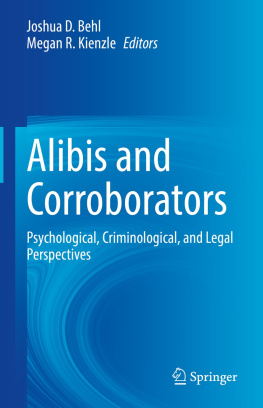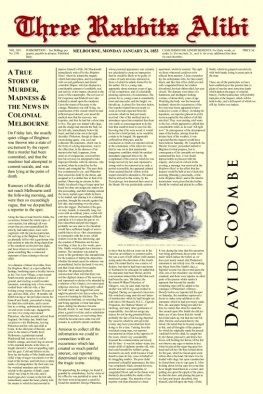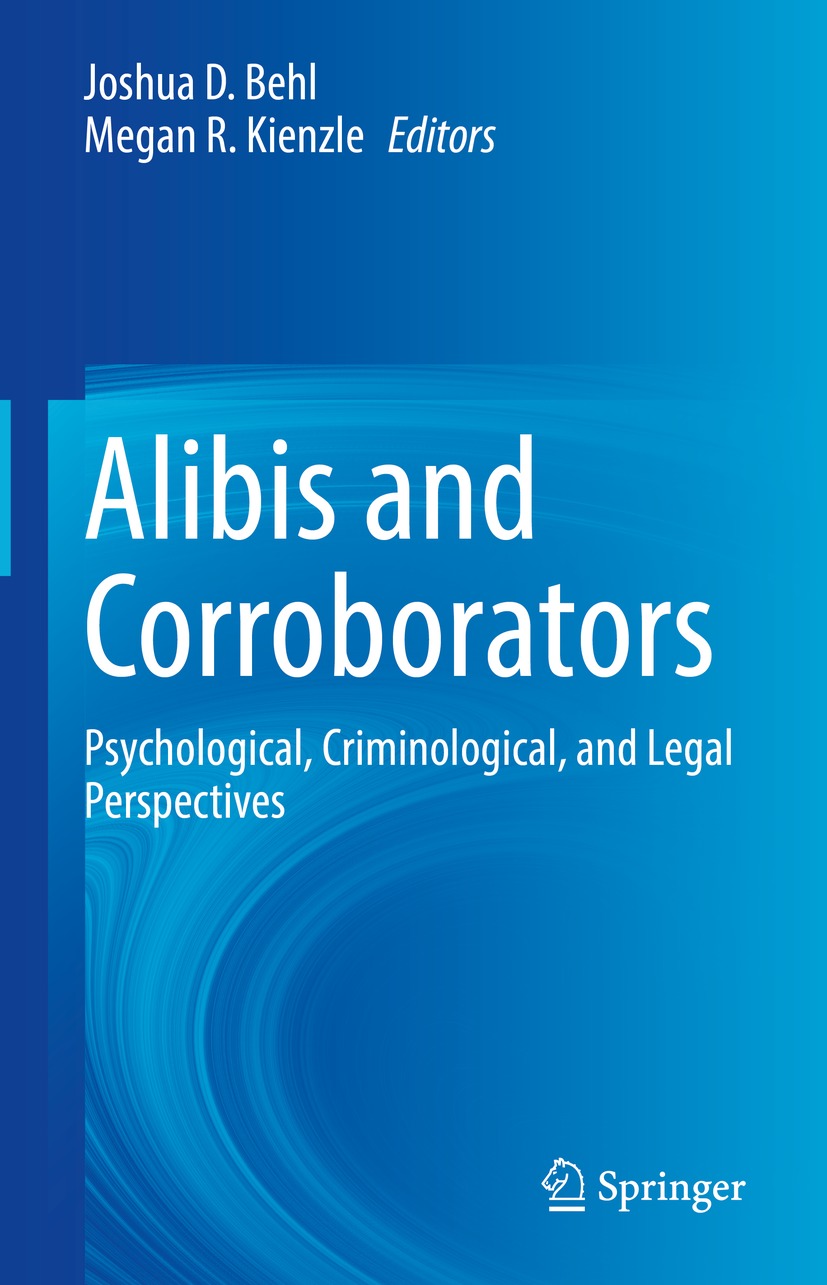Editors
Joshua D. Behl and Megan R. Kienzle
Alibis and Corroborators
Psychological, Criminological, and Legal Perspectives

Logo of the publisher
Editors
Joshua D. Behl
Department of Behavioral Sciences, Flagler College, Saint Augustine, FL, USA
Megan R. Kienzle
Department of Criminal Justice, Austin Peay State University, Clarksville, TN, USA
ISBN 978-3-030-95662-2 e-ISBN 978-3-030-95663-9
https://doi.org/10.1007/978-3-030-95663-9
The Editor(s) (if applicable) and The Author(s), under exclusive license to Springer Nature Switzerland AG 2022
This work is subject to copyright. All rights are solely and exclusively licensed by the Publisher, whether the whole or part of the material is concerned, specifically the rights of translation, reprinting, reuse of illustrations, recitation, broadcasting, reproduction on microfilms or in any other physical way, and transmission or information storage and retrieval, electronic adaptation, computer software, or by similar or dissimilar methodology now known or hereafter developed.
The use of general descriptive names, registered names, trademarks, service marks, etc. in this publication does not imply, even in the absence of a specific statement, that such names are exempt from the relevant protective laws and regulations and therefore free for general use.
The publisher, the authors and the editors are safe to assume that the advice and information in this book are believed to be true and accurate at the date of publication. Neither the publisher nor the authors or the editors give a warranty, expressed or implied, with respect to the material contained herein or for any errors or omissions that may have been made. The publisher remains neutral with regard to jurisdictional claims in published maps and institutional affiliations.
This Springer imprint is published by the registered company Springer Nature Switzerland AG
The registered company address is: Gewerbestrasse 11, 6330 Cham, Switzerland
Joshua D. Behl:
To my wife, Taylor
Megan R. Kienzle:
To my family
Joshua D. Behl and Megan R. Kienzle:
Together, we would like to also dedicate this book to our advisor, mentor, and friend Dr. Lora Levett
Preface
Consider this: the police come to your door and ask you where you were on a Monday evening approximately 6 months ago. Without much thought, you reply I was sitting at home with my family eating dinner. You have just offered the police an alibi. These statements are seemingly innocuous enough. After all, people are accused of crimes all the time. Those that are innocent should have an alibi or a claim that they were elsewhere at the time of the crime. However, that claim is a lot easier to generate than it is to support. And still easier to support than it is to be believed in court.
This book is the first of its kind to be published on the nascent topic of alibis and corroborators. At the time of this publication, there are roughly 200 articles and book chapters dedicated to the topic of alibis in some capacity. However, the field has yet to be organized in any kind of consistent, coherent manner. Therefore, this book should be viewed as a state of the science on the topic. Each chapter is a complete overview of specific research focus within the larger topic of alibis and corroborators, and each could be viewed as stand-alone chapters. However, we believe that the book is best read in its entirety, as some topics (e.g., generation and believability) go hand in hand.
As you read through this book, you will quickly notice that each chapter has at least one case of wrongful conviction that will be profiled. This case is used as a reference case around which the chapter is structured. What readers will also notice is that there is a lot more work that still needs to be done. To that end, each author developed a series of research questions that the editors compiled into a fairly comprehensive appendix at the back of the book. From graduate students looking for research ideas to seasoned scholars who are interested in such topics as eyewitnesses, social influence, power structures, race, investigator bias, tunnel vision, and lie detection, there is so much that we do not yet know that could be answered by our collective efforts. That is the humble goal of this book to provide an overview of what we do know so that we can all work together to answer the questions that we do not know.
Joshua D. Behl
Megan R. Kienzle
St. Augustine, FL, USA Clarksville, TN, USA
November 2021
Acknowledgments
Together, we would like to thank the various faculty and staff at Flagler College and Austin Peay State University who made this project a reality. We also would like to acknowledge Dr. Lora Levett and Dr. Kelsey Henderson who have been a constant support throughout our academic careers. We would not be where we are today without the continuous support and encouragement we have received from all of you. We would also like to recognize and thank our tremendous contributing authors who made our job as editors easy and interesting. This book could not have been possible without them. We would also like to thank the editorial team at Springer for taking a chance and trusting two junior scholars with a first-of-its-kind book of this magnitude.
Acknowledgments by Joshua D. Behl
It is my great pleasure to publicly thank my family for their constant outpouring of love and support. Specifically, to my wife, Taylor, and dog, Ruby; parents, Helen Carnegie and Chuck and Nicole Behl; my siblings, Bryan and Marissa Behl, Amanda and Jared Chute, Jessica and Dan Moose, and Jacob Vondran; and my in-laws, Ruth and Daryl Reimer, and Mark and Julie Allegood as well as a host of siblings-in-law, uncles, aunts, cousins, and many more. To have you all in my corner every day is the greatest blessing. I would also like to acknowledge the support of my Flagler College colleagues who have made working at Flagler College a tremendous pleasure. Worth mentioning again are the debts I owe to my wife, Taylor, for always being there for me through the long nights of editing and Zoom calls; to love you is to know you, to be loved by you is greater than anything in this life. And to my parents, Helen and Chuck, your unconditional love and support throughout my life have made everything I have ever done possible. This book is more a reflection of you than it could ever be of me. Finally, I want to thank my co-editor, Megan, for everything you have done to help throughout my academic career, from being my lab supervisor when I was in undergrad to being my most consistent collaborator, co-author, and friend.
Acknowledgments by Megan R. Kienzle
First and foremost, I want to thank my parents, Carol and Doug, for their never-ending support and encouragement of all I do, both personally and professionally. I am thankful for my sister, Emily, and brother-in-law, Jeremy, and all my aunts, uncles, cousins, and beyond who have been my constant champions since day one. I am blessed with incredible friends from all stages of my life who are now scattered throughout the country (and world). I want to thank them all for being there for me in good times and bad, always ready with a supportive ear to listen, and a laugh to make sure I do not take things too seriously you know who you are, and I miss you all! I am especially appreciative of my colleagues here at Austin Peay, in the department and elsewhere around campus, for creating a supportive environment in which to thrive. To my favorite fuzzy companion, my dog Nessie, for sleeping at my side while reading, writing, and editing drafts of this book. Finally, I want to thank my incredible co-editor, co-author, colleague, and friend, Josh, for going on this journey together. Without each and every one of you, I would not be who I am, and I am eternally grateful for you every day.









